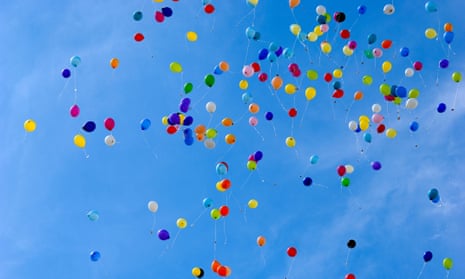The mass release of balloons will be a thing of the past in Queensland and the days could be numbered for takeaway coffee cups as the state moves ahead with a ban on plastics.
Polystyrene packing “peanuts”, plastic-stemmed cotton buds and microbeads will all be banished from September 2023 under a new five-year plan.
The balloon ban will target the mass release of lighter-than-air varieties – such as helium – from next year, while new minimum standards will be introduced for heavy plastic bags.
They’ll soon have to be tested for reusability and how they can ultimately be recycled, the state’s environment minister, Meaghan Scanlon, said.
Government survey results show more than 90% of Queenslanders back tightening restrictions on single-use plastics.
The state began phasing out lightweight plastic shopping bags in 2018. Last year it outlawed a range of plastic products including straws, stirrers and expanded polystyrene.
“It’s great to see so many businesses already taking voluntary measures and going beyond our bans, and it is time to support those voluntary commitments and strengthen our actions in the fight against plastic pollution,” Scanlon said.
The roadmap would phase out other single-use plastics, including disposable coffee cups.
An innovation challenge will investigate potential replacements and the state hoped to work with other jurisdictions on a national approach in coming years.
“We understand these changes can have an impact on businesses and we will work with them to ensure they are ready,” Scanlon said.
Potential bans on bait bags, bread-bag tags, takeaway containers and sauce sachets will also be investigated.
Friday’s announcement saw the sunshine state edge ahead of South Australia to claim second spot on WWF Australia’s ranking of efforts to minimise single-use plastics.
“This plan will stop some of the most damaging single-use plastics from entering Queensland’s beaches and waterways,” said No Plastics in Nature Policy manager at WWF Australia, Kate Noble.
“It will also create a real opportunity for Queensland to not just transition away from single-use plastics, but move towards a more sustainable approach where reuse is normal and our use of disposables is massively reduced.”
Western Australia maintained top spot on the WWF list after banning single-use plastic bowls, plates, cutlery, straws and polystyrene food containers last year.
South Australia is in third place with further commitments expected this year, while the ACT, New South Wales and Victoria are tied for fourth.
Tasmania and the Northern Territory continue to lag behind in fifth and sixth place respectively.
